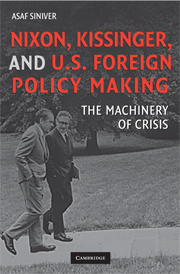Book contents
- Frontmatter
- Contents
- List of Figures
- Acknowledgments
- Abbreviations
- Dramatis Personae
- Nixon, Kissinger, and U.S. Foreign Policy Making
- Introduction
- 1 Structures, Processes, and Personalities in U.S. Foreign Policy
- 2 The Making of U.S. Foreign Policy During the Nixon-Kissinger Years
- 3 The Incursion into Cambodia, Spring 1970
- 4 The Jordanian Crisis, September 1970
- 5 The India-Pakistan War, December 1971
- 6 The Yom Kippur War, October 1973
- Conclusion
- Bibliography
- Index
- Plate section
- References
2 - The Making of U.S. Foreign Policy During the Nixon-Kissinger Years
Published online by Cambridge University Press: 17 August 2009
- Frontmatter
- Contents
- List of Figures
- Acknowledgments
- Abbreviations
- Dramatis Personae
- Nixon, Kissinger, and U.S. Foreign Policy Making
- Introduction
- 1 Structures, Processes, and Personalities in U.S. Foreign Policy
- 2 The Making of U.S. Foreign Policy During the Nixon-Kissinger Years
- 3 The Incursion into Cambodia, Spring 1970
- 4 The Jordanian Crisis, September 1970
- 5 The India-Pakistan War, December 1971
- 6 The Yom Kippur War, October 1973
- Conclusion
- Bibliography
- Index
- Plate section
- References
Summary
Certain day-to-day problems are held up because [Kissinger] will not allow the inter-agency machinery to go to work on them…Dr. Kissinger's references to the representatives of the State Department, Defence Department etc at Under Secretary level as ‘my advisers’ do not contribute to a smooth working of the policy machine.
Research Department, British Foreign and Commonwealth Office, 9 February 1972Students and observers of the Nixon administration are faced with particular difficulty when attempting to evaluate foreign policy making during this period, as the president's remarkable achievements in foreign affairs are sometimes hard to reconcile with his less remarkable personality. President Truman described Nixon as ‘a no-good lying bastard. He can lie out of both sides of his mouth at the same time, and if he ever caught himself telling the truth, he'd lie just to keep his hand in.’ Even Henry Kissinger warned in 1968: ‘Richard Nixon's being nominated by the Republican party is a disaster and thank God he can't be elected president or the whole country will be a disaster area.’ While Kissinger's remark should be placed in context – it was made while he was advising Nelson Rockefeller, Nixon's chief rival in the 1968 Republican presidential elections – it nevertheless suggests that Nixon's disgraceful resignation from office in 1974 following the Watergate affair merely completed the demonization of Nixon, and that adverse publicity had accompanied the man since the beginning of his political career, in the immediate aftermath of World War II.
Nevertheless, as Joan Hoff accurately observed, the one area in which Nixon's achievements have mostly obscured his notorious personality traits has been foreign policy.
- Type
- Chapter
- Information
- Nixon, Kissinger, and US Foreign Policy MakingThe Machinery of Crisis, pp. 40 - 70Publisher: Cambridge University PressPrint publication year: 2008



